Baby Teeth 101
Learn about baby teeth and what to expect as your child grows.
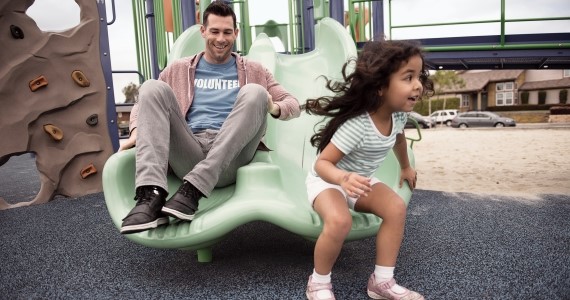
Why Do Children Have Baby Teeth?
Baby teeth are also known as primary, milk, or deciduous teeth. They start developing beneath the gums before a child is born. However, they generally do not start to appear in the mouth until six months of age. Between the ages of six months and three years, a total of 20 baby teeth will erupt. These baby teeth aren't just a practice set. They work as placeholders for the larger, permanent, adult teeth that will show up later. In addition, they are essential in speech development and digestion.
If a young child loses a baby tooth too early for any reason, that placeholder is gone. To keep the space ready for the permanent tooth to erupt, the dentist will often place a space maintainer in the area where the tooth is missing.
When Do Children Lose Their Baby Teeth?
Children will generally start to lose their baby teeth around six years of age, usually in the same order as when the teeth first erupted. Children typically lose all baby teeth by age 12.
When the permanent teeth hiding below the gums are ready to start coming in, the roots of the baby tooth above it will start to dissolve, eventually leaving the baby tooth attached only by the gum tissue surrounding it. Without the root to stabilize the tooth, it wiggles and becomes loose.
What Should I do When a Baby Tooth Comes Out?
It isn't unusual for children to experience some discomfort, pain, or even some light bleeding when a baby tooth comes out.
After the tooth comes out, have your child clean the area by rinsing gently with warm salt water. If there is still bleeding, place a small amount of gauze over the area, applying light pressure until the bleeding stops. Once the bleeding stops, you can apply an over-the-counter topical anesthetic for discomfort.
Should a Loose Tooth be Pulled?
Though a loose tooth can cause some discomfort or annoyance while eating, loose teeth shouldn't be pulled using string or floss. To see if a loose tooth is truly ready to come out, you can place tissue over the tooth and gently squeeze. If the tooth pops out, it was ready! Be patient and allow more time if the tooth does not pop out easily.
Are There Times When I Should Call My Child's Dentist After They Lose a Baby Tooth?
It is not uncommon for a child to have some swelling in an area where a tooth is loose and ready to fall out. If necessary, children's ibuprofen can be used to help minimize this. Call your dentist if your child has a swollen socket or bleeding persists.
Most children start losing their baby teeth around age six, but every child is different. If your child's teeth were slow to come in, they will likely take a little longer to lose. However, talk to your dentist if your child hasn't experienced their tooth eruption or shedding milestones within a year of the timelines listed below.
Teach your child about the importance of taking good care of their teeth from an early age. Routine check-ups will help them eliminate fears and develop a relationship with their dentist. In general, your child should have their first dental check up by one year of age and every six months after.
Tooth Chart
To see if your child's dental development is following general milestones for primary teeth, review this tooth chart. The table shows the age when you might expect your child's baby teeth to erupt and the age when they are likely to be shed.
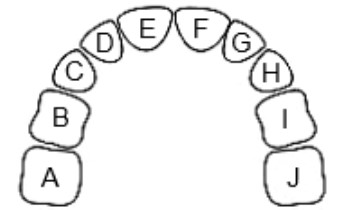
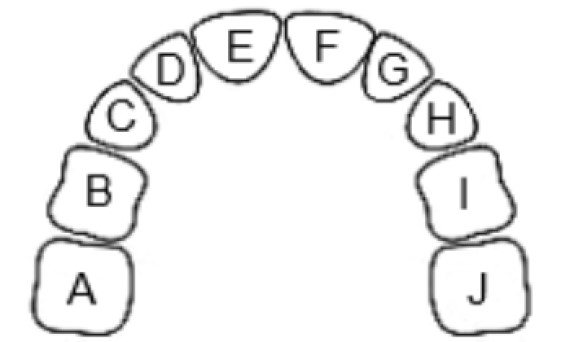
| Number | Erupt | Shed | Upper Teeth |
|---|---|---|---|
| A,J | 25-33 mos | 10-12 yrs | Second Molar |
| B,I | 13-19 mos | 9-12 yrs | First Molar |
| C,H | 16-22 mos | 10-12 yrs | Canine (cuspid) |
| D,G | 9-13 mos | 7-8 yrs | Lateral Incisor |
| E,F | 8-12 mos | 6-7 yrs | Central Incisor |
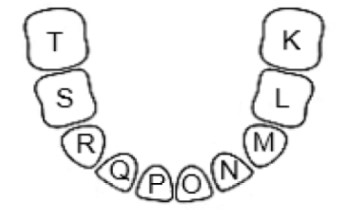
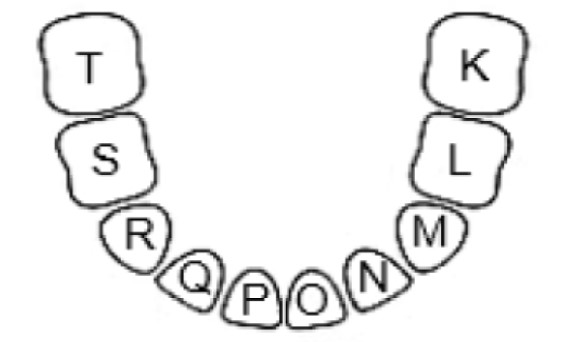
| Number | Erupt | Shed | Lower Teeth |
|---|---|---|---|
| K,T | 23-31 mos | 10-12 yrs | Second Molar |
| L,S | 14-18 mos | 9-11 yrs | First Molar |
| M,R | 17-23 mos | 9-12 yrs | Canine (cuspid) |
| N,Q | 10-16 mos | 7-8 yrs | Lateral Incisor |
| O,P | 6-10 mos | 6-7 yrs | Central Incisor |
Note: The information in this document is not meant to replace the advice of your dentist or another licensed healthcare professional. Talk to your dentist for any specific dental advice.






